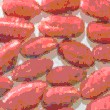The red yeast rice alternative to statins
 Red yeast rice decreases LDL (bad) cholesterol levels.
Red yeast rice decreases LDL (bad) cholesterol levels.
Researchers from Philadelphia, Pennsylvania studied it’s potential as an alternative treatment option in patients who cannot tolerate statins.
First, the details.
- 62 patients were randomly assigned to take red yeast rice 1800 mg or placebo twice daily for 24 weeks.
- All patients were also enrolled in a 12-week therapeutic lifestyle change program.
And, the results.
- In the red yeast rice group, LDL cholesterol decreased 1.11 mmol/L (43 mg/dL) after 12 weeks and decreased 0.90 mmol/L (35 mg/dL) after week 24 weeks.
- With placebo, LDL cholesterol decreased 0.28 mmol/L (11 mg/dL) and 0.39 mmol/L (15 mg/dL) at weeks 12 and 24, respectively.
- The reduction in LDL cholesterol was significantly greater in the red yeast rice group.
- There were no differences in HDL (good) cholesterol, triglyceride, liver enzymes, pain, or creatine phosphokinase (CPK).
- The CPK enzyme is found in the heart, brain, and skeletal muscles. It’s released into blood after these organs are injured, and serves as a marker for the damage.
The bottom line?
In these patients, red yeast rice and therapeutic lifestyle change decreased LDL cholesterol without increasing CPK or pain. It might be a treatment option in patients who can’t tolerate statin therapy, concluded the authors.
Statins are the mainstay of cholesterol therapy today. Significant side effects associated with statins are infrequent. Among the side effects associated with a rise in CPK blood levels, myalgia and arthralgia (muscle and joint pain) have been reported in 1% to 7% of patients taking statins. A more serious complications of statin therapy is rhabdomyolysis (muscle destruction that can lead to kidney failure). This side effect is rare and generally associated with concurrent fibrate use — another class of drugs use to treat lipids.
Some patients who can’t tolerate one statin may tolerate another. And there in lies the rationale for using red yeast rice, which contains several compounds collectively known as monacolins that inhibit cholesterol synthesis. One of these, “monacolin K” is also known as mevinolin or lovastatin, a statin drug and the active ingredient in the prescription drug known as Mevacor.
Red yeast rice is essentially Mevacor, without the prescription, and, unfortunately, without the manufacturing quality control standards either.
6/16/09 10:12 JR